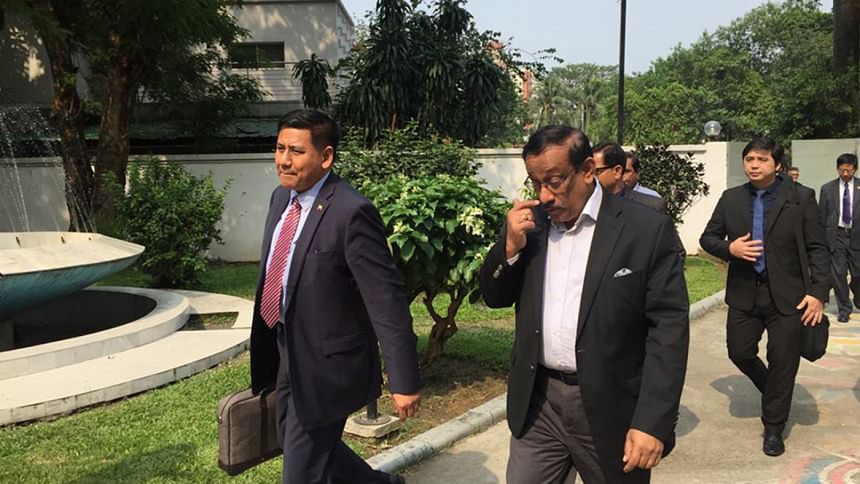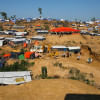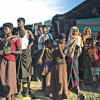No date for repatriation

The Joint Working Group has failed to fix any date to start repatriation of around 700,000 Rohingyas even three months after Bangladesh handed over a list of 8,032 refugees to Myanmar.
The JWG, responsible for overseeing the repatriation, held its second meeting in Dhaka yesterday after about four months, but it ended without any concrete decision.
“This type of repatriation is always complex and difficult. But there is no difference of opinion that the repatriation should happen. Both the sides [Dhaka and Naypyidaw] feel that the repatriation should be done quickly,” Bangladesh Foreign Secretary Shahidul Haque said yesterday.
“We are discussing the challenges,” he said without mentioning what the challenges are.
Shahidul was briefing reporters after emerging from the JWG meeting held at the state guesthouse Meghna in the capital.
With 15 officials each from Bangladesh and Myanmar, the JWG was formed after the signing of the repatriation deal between the two countries on November 23 amid global criticism of Myanmar atrocities that led to the influx of around 700,000 Rohingyas to Bangladesh from Rakhine since August last year.
“The best part is that both sides have openly discussed the issues and agreed on quick repatriation,” said Shahidul who led the Bangladesh side at yesterday's meeting.
The Myanmar side was led by its Permanent Secretary Myint Thu.
The first meeting of the JWG was held on January 15 in Naypyidaw.
On February 16, Bangladesh handed over a family-wise list of 8,032 Rohingyas to Myanmar at a meeting in Dhaka.
Since then, Myanmar has sent back the names of only 1,000 Rohingyas after verifying their residency in Rakhine. But none of them has been repatriated yet.
Rohingya community leaders and experts have criticised the provision of verification of Rohingya residency, arguing that they fled their homes that were torched, and it was illogical to expect that they would have documents to prove their residency.
Dr Wakar Uddin, a Rohingya community leader based in the US, recently told The Daily Star that it was funny to think that Bangladeshis would want to go to Rakhine.
“So, why is the verification?” he said, adding that verification was meant to complicate the repatriation.
Myanmar officials have alleged that the verification forms sent to Myanmar were not properly filled out by the Rohingyas in Bangladesh.
Bangladesh officials, however, have refuted the allegation.
The foreign secretary yesterday said, “We have not given them [Myanmar] any flawed list. They also did not make any mistake. We are discussing that. They will slowly verify the list of the Rohingyas.”
The Myanmar permanent secretary did not say anything about the reasons behind the delay in the repatriation process or the challenges in verifying the refugees.
“We are here for that. We will accelerate the process. We are working on that,” he told reporters, adding that they would hold more meetings and devise a mechanism to receive the Rohingyas in Myanmar.
“We will be working hand in hand based on the agreement. We will work it out and then the repatriation will start,” he said without giving any time frame.
In a statement last night, the Bangladesh foreign ministry said Dhaka stressed the need for creating a conducive environment in Rakhine, which includes safety and security of the returnees, rebuilding villages, access to livelihood and freedom of movement.
To build confidence among the Rohingyas to return to Rakhine, the Bangladesh side also emphasised “verifiable concrete information” from the Myanmar side for sharing it with the refugees.
Seeking anonymity, two Bangladesh officials, who attended yesterday's JWG meeting, told this newspaper that the Myanmar side agreed to the proposal for a Bangladesh delegation's visit to Rakhine. But the date was not fixed.
One of the two officials said, “We told the Myanmar side that it is not enough to say that things are improving and fine in Rakhine. They have to give the UN and other aid agencies, and the media unfettered access to Rakhine.”
The Myanmar officials told the meeting that Naypyidaw would sign an agreement with the UN Refugee Agency and the UNDP soon to allow them to work in Rakhine to help with the repatriation, added the official.
The other Bangladesh official said that when the issue of Rohingya citizenship was raised, Myanmar officials said the refugees will have to apply for National Verification Card (NVC), which will eventually lead to their citizenship.
“We told the Myanmar officials that the Rohingyas don't want the cards because they have to identify themselves as Bangalees in those.
“The Myanmar side said they will consider removing this option from the form.”
The Myanmar side also said they were working to promote inter-faith harmony and taking confidence-building measures and promoting development to upscale economic progress in Rakhine, one of Myanmar's poorest states, mentioned the official.
“There is no short cut to solving the Rohingya problem ... It has to be sustainable,” added the official.
The Rohingyas, who experienced killings, rapes, burning of their houses and other forms of torture in the brutal military crackdown, say they want guarantee of citizenship, recognition of Rohingya ethnicity, security under the UN presence in Rakhine and return to their homes, not to the camps that the Myanmar authorities have set up.
UN Security Council members, who recently visited Rakhine, said the conditions were not conducive for the return of the refugees to Rakhine, where they have been denied citizenship, government jobs, higher education, right to free movement and healthcare since 1982.

 For all latest news, follow The Daily Star's Google News channel.
For all latest news, follow The Daily Star's Google News channel. 






Comments